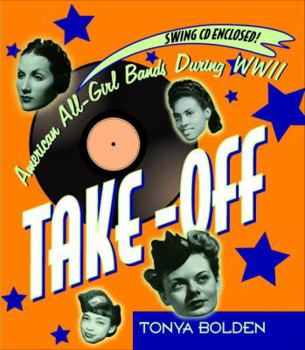Take-Off (Bk & CD): American All-Girl Bands During World War II
Select Format
Select Condition 
Book Overview
The 1940's was a time when society thought it improper for women to make a sax wail or let loose hot licks on skins, but with the advent of World War II and many men away fighting the war, women... This description may be from another edition of this product.
Format:Hardcover
Language:English
ISBN:0375827978
ISBN13:9780375827976
Release Date:May 2007
Publisher:Knopf Books for Young Readers
Length:80 Pages
Weight:1.10 lbs.
Dimensions:9.4" x 0.5" x 8.4"
Age Range:10 years and up
Grade Range:Grade 5 and higher
Customer Reviews
1 rating
brave and brilliant contribution to women's music
Published by Thriftbooks.com User , 18 years ago
To all naïve readers who still think Kathleen Hanna, Courtney Love or Liz Phair were doing anything new by boldly storming their way into previously male territory, may I suggest Tonya Bolden's Take-Off? A quick and easy read, complete with photos, newspaper clippings and an obsessive amount of research, Take-Off chronicles the rise and eventual fall of "all-girl" big bands of the World War II era, proving once and for all that every female musician from Nancy Wilson to the Go-Go's to any number of riot grrrls would still be just singing in the shower were it not for the brave and brilliant contribution of the swing musicians who fought sexual and racial discrimination in order to prove, in no uncertain terms, that "girl musicians...are as much the masters of their instruments as are male musicians." Take-Off (which is slang for an improv solo) tells an abbreviated story, for sure, but nonetheless lays it out: 16 million American men served in World War II, and their absence created room for more than just Rosie the Riveter; it also allowed space for The Hour of Charm All Girl Orchestra, Ada Leonard (a former stripper) and her All-American Girl Orchestra, and The International Sweethearts of Rhythm, among others. And while Take-Off will never be confused with a hard-hitting piece of feminist scholarship, Bolden does offer tentative critiques of the ways in which patriarchy forced the hands of the women she chronicles, explaining, for example, that as female musicians got bolder and player harder music, they compensated by dressing softer, trading in their simple skirts and blouses for strapless gowns with hem-to-hem ruffles the musicians had to iron on their travel suitcases. She also dedicates significant time detailing race relations of the time and the importance of single-race bands. Bolden's use of jazz-era slang throughout the book often feels a bit silly and heavy-handed, but Take-Off is still a commendable exploration of the women who worked to dismantle the myth that "only God can make a tree, and only men can play good jazz." And perhaps best of all, the book comes with a CD of some of the most exciting swing music to come from the WWII era, reason enough to buy this book! While Take-Off is hardly definitive, it takes a necessary step in establishing that contrary to public opinion of the time, not all "women like violins."





